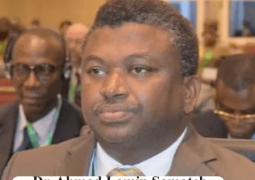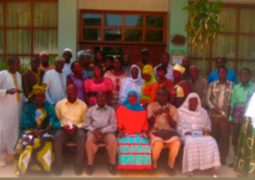
(Friday 18 October 2019 Issue)
The Ministry of Petroleum and Energy (MoPE) on Tuesday validated the off-grid solar market assessment report for The Gambia organised as part of the preparatory phase of the Regional Off-grid Electrification Project (ROGEP) funded by the World Bank and Clean Technology Fund and implemented by the ECOWAS Center for Renewable Energy and Energy Efficiency (ECREEE) together with West African Development Bank.
The
ROGEP is supporting The Gambia and 18 other countries in West Africa and the
Sahel, to accelerate the development of standalone solar PV systems in off-grid
areas to increase electricity access by stimulating both public and private
sector investments in rural electrification.
The
objective of the study is to assess the market for off-grid solar systems and
recommend the most realistic market-based mechanism(s) that will lead to
scaling up access using solar technologies by the private sector.
In
her opening statement on behalf of the Minister of Petroleum and Energy, Rohey
Bittaye-Darboe Permanent Secretary at MoPE said energy has long played, and
continue to play a strategic role in the growth and functioning of the world’s
economy.
Mrs.
Bittaye-Darboe described access to electricity as a prerequisite for the
establishment of new businesses and the expansion of existing ones, providing
the platform for employment creation, social development and economic growth.
“The
availability of reliable electricity supply that is efficient, affordable and
environmentally friendly is one of the cornerstones of the Gambia Government’s
development aspirations for the energy sector,’’ she said that, keeping with
the global energy transition towards renewable energy systems, the government
is committed to promoting the use of off-grid solutions including standalone
home systems as a necessary vehicle to provide electricity access to those
communities beyond the reach of the grid.
According
to her, as part of their strategy for universal electricity access, the Gambia
government has set a target to connect one-third of the rural population
through off-grid solutions by 2030, which includes mini-grids and standalone
home systems but was quick to add that this target cannot be readily achieved
without establishing the right market conditions, putting in place an effective
quality assurance framework and developing financial support and de-risking
mechanisms for the private sector.
Sire
Abdoul Diallo, ECREEE representative for his part said it is important to
understand the framework conditions to ensure interventions are in line with
close existing conditions and are able to change the course.
He
expressed their readiness to work with The Gambia in ensuring the report
reflects everybody’s views and realities on the ground, adding that they hope
the project will be able to address issues The Gambia face in terms of
electrification.
While
in The Gambia, Mr Moore is also expected to visit Rotary projects that have
been carried out by the members of Rotary Clubs in The Gambia for the public.
These
projects include the Science lab in Kanifing and the Wash Project and Diabetic
Foot Center in Edward Francis Small Teaching Hospital.
Mr
Moore will also visit Bundung Maternal and Child Hospital to learn firsthand
the effects of malaria on pregnant women and children under 5 years old in The
Gambia.
Rotary
International is an international non-governmental, non-profit humanitarian
service organisation which has over 3,500 Rotary clubs worldwide and a membership
of 1.2 million individuals known as Rotarians.
Its
goal is to provide service to others, promote integrity, and advance world
understanding, goodwill, and peace through our fellowship of business,
professional, and community leaders. Rotary’s key focus areas include promoting
peace; fight diseases; provide clean water, sanitation and hygiene; save
mothers and children, support education and grow local economies.



